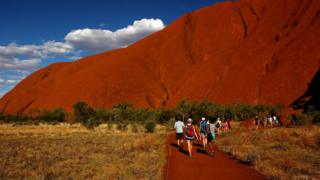Home » Australasia »
Should I have climbed Uluru?
From 2019 climbing on Uluru will be banned in respect of the wishes of Anangu Aboriginal Australians.
The rock is a major visitor attraction, and many tourists visit the landmark to scale the rock.
Visitors to the site explain why they chose to climb, or not climb, the sacred landmark.
You may also like:
‘I was a naive kid’
Peter Quinn worked as a tour guide leading groups of visitors on hikes to the top of Uluru in the 1980s. Peter told the BBC he was ignorant of the cultural sensitivities of Uluru at the time.
“I was a naive kid when I was climbing the rock. It was unbelievably disrespectful for me as a twenty-something boy from Melbourne to be educating tourists about Aboriginal history.
“I remember one time I spotted a 12-year-old boy carving his name into the rock. I asked him to stop, and his mother told me he wasn’t doing anything wrong.
“Education is the key to empathy. When I was a tour guide Australians didn’t learn about the history of the Aboriginal people. I think that is changing.
“I wish I had spoken to the local Aboriginal community and had them educate people about their culture and history.
“It is a privilege to visit these sites. We don’t all have the right to take a selfie wherever we want.
“My advice to my younger self would be not to overestimate your right to do what you want, respect the rights of other people.”
‘A step too far’
Richard Hiller is pleased he got the opportunity to climb the landmark in 1998 as part of a round-the-world trip.
“I don’t buy the idea that you’re damaging the rock by climbing it,” he says.
“I understand it is a spiritual site, but banning people from climbing it is a step too far.”
Richard describes his experience of reaching the top of the rock as “worthwhile”.
“It wasn’t that busy when I visited. If there are lots more visitors, I can see it may be a bit different for the Aboriginal community.
“But I still think that banning people from experiencing climbing to the top is a real shame.
“I worry that banning tourists from walking on the rock will damage the local economy and negatively impact the Aboriginal people in the area.”
‘Disrespectful and selfish’
Zoe Barker from Leicester visited the giant red rock when she was 18 but chose not to join other members of her tour group in climbing it.
Zoe admits she wasn’t aware of the significance of the site when she visited. However, after speaking to her tour guide, she decided against scaling the rock.
“I made the educated choice not to climb. I wanted to be respectful to the Aboriginal community.
“The people in the group who did climb were being a bit disrespectful and selfish, but I am not going to tell them off for it.”
Zoe thinks visitors can enjoy Uluru without climbing it.
“I walked around the base of the rock, which was really lovely. It had been raining and there were beautiful waterfalls cascading down the rock face.”
Interviews and written by George Pierpoint, UGC and Social News
Source: Read Full Article



